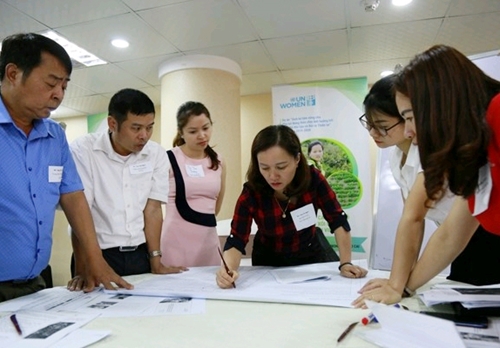Vu Phuong Ly, a programme specialist at the UN Women Vietnam, said that if women are not given the opportunity to equally participate in activities combating climate change and disaster risks, their vulnerability is likely to increase.
Therefore, gender equality has been seen as the foundation for disaster risk management and climate change adaptation, as well as the path towards sustainable development goals (SDGs), she noted.
Pham Thi Ha Phuong, an official of the same programme, said that up to 63.4 percent of women in rural households in Vietnam engage in agricultural production.
    |
 |
|
Participants at the event discuss the implementation of the project. Source: UN Women |
With limited access to information, resources, credit, markets, vocational training programmes, and agriculture extension services, the group has a limited capacity to adapt to and cope with the effects of climate change and natural disasters.
The official also pointed to the current undefined role of women in making decisions relating to the combat against disasters and climate change
Delegates at the event brought up preparations for the implementation of sustainable livelihood models in support of ethnic minority women in the northern mountainous province of Lao Cai and women in the central coastal province of Quang Nam.
The models form part of the project on sustainable livelihood for rural women amidst climate change and disaster risks, which is under the programme on improving women’s livelihood and participation towards better resistance against disaster risks and climate change adaptation.
Vietnam is one of countries most vulnerable to and most affected by climate change and natural disasters. The Global Climate Risk Index 2015 for the period 1994-2013 ranked Vietnam in seventh place.
It is estimated that more than 70 percent of the Vietnamese population, and especially women and children, are particularly vulnerable to the effects of natural disasters.
Source: VNA